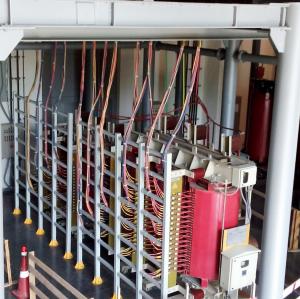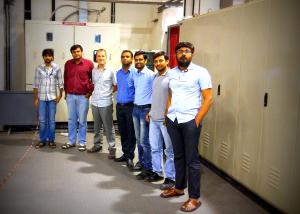India successfully tests power supplies for heating system
3 Oct 2016
-
Indian Domestic Agency
A 3 MW radio frequency high voltage power supply has been successfully operated at ITER parameters. Procurement can begin in India for the ITER ion cyclotron resonance heating power supplies.
Ion cyclotron resonance heating (ICRH) is one of three external heating systems that ITER will rely on to bring the plasma to fusion temperatures.
Radio waves at specific frequencies (40-55 Mhz) are generated by radio frequency sources, moved along massive transmission lines to two 45-tonne launchers, and finally transferred into the plasma through ports in the vacuum vessel. ICRH heating will deliver 20 MW of heating power into the ITER machine.
A team in India is overseeing the procurement of nine radio frequency sources for the ITER ICRH heating system and corresponding high voltage power supplies. At a dedicated R&D laboratory in Gandhinagar, work is underway to demonstrate the requirements for ITER deliverables, including a development program for a 2.5 MW radio frequency amplifier.
In recent news, a 3 MW dual output high voltage power supply system supplied by contractor ECIL (Electronics Corporation of India Limited) was successfully operated at ITER parameters. The layout of the system was chosen to mimic the exact configuration that will be used at ITER, with a pair of cast resin multi-secondary transformers place at ground level and the electronics at mezzanine levels. Interconnecting cables are routed through high voltage feedthroughs on the upper floor.
The team in front of the power cubicles at the dedicated lab in Gandhinagar: Dishang Upadhyay, Rasesh Dave, Thibault Gassmann, Amit Patel, Hitesh Dhola, Niranjan Goswami and Kush Mehta.
The high voltage power supply was operated continuously and successfully, delivering 2.8 MW of output power to drive 1.5 MW diacrode-based amplifiers on matched and mismatched loads.
These successful results will allow the Indian Domestic Agency to begin the procurement of power supplies for the ITER ICRH system.



